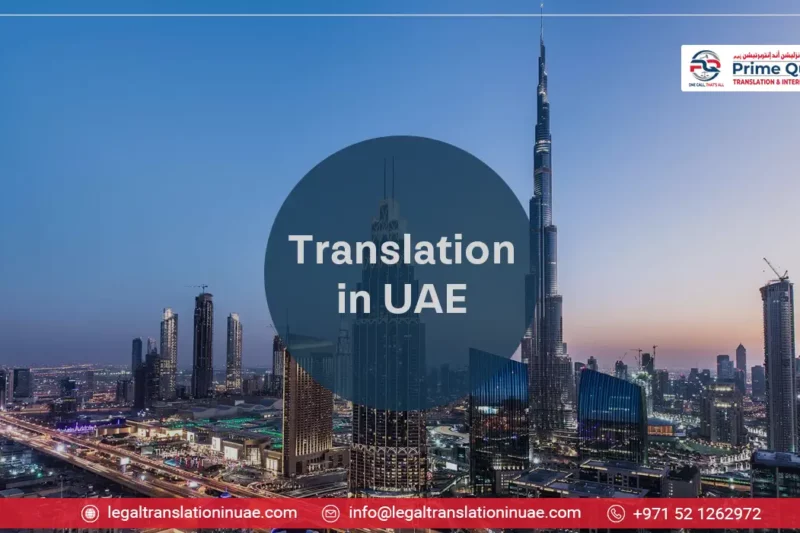
Here is our blog article on the value of translation in Dubai. The need for translation services has increased due to the vibrant city's rapid rise in international commerce and tourism. Dubai is a center for language services due to its multicultural population and widespread reach.
In this article, we will discuss the importance of translation in Dubai and how it helps to overcome linguistic and cultural hurdles. Let's get started and examine why translation is necessary in Dubai.
Why is Translation a Necessity in Dubai for the Diverse Business Landscape?
Translation services are a must in Dubai's varied commercial environment. With a population that is multicultural and global in scope, efficient communication is essential. In addition to bridging language gaps, translation in Dubai promotes closer relationships with partners, clients, and customers.
Ultimately, it enhances prospects in Dubai by promoting effective cooperation and mutual understanding in a culturally varied setting. It supports a variety of business elements, from meetings and negotiations to marketing and customer service.
Impact of Globalization and Business on the Demand for Translation Services
The need for translation services has increased due to globalization and Dubai's flourishing commercial environment. Prime Quality Translation facilitates effective dialogue, and In Dubai, translation fills linguistic gaps.
Because of the city's widespread appeal, diversified population, and an influx of foreign businesses, businesses increasingly prioritize accurate, culturally relevant translations. Effective communication with partners and clients requires removing linguistic barriers with a professional translation.
How Does Translation in Dubai Promote Cultural Understanding and Improve Communication?
Translation in Dubai is vital in improving communication and promoting cross-cultural understanding. Translation enables successful communication between speakers of several languages by removing obstacles based on language. This facilitates efficient corporate operations and opens doors for meaningful relationships and teamwork.
Ensuring that messages are correctly presented in a culturally appropriate manner is another way translation helps close cultural differences. It encourages respect and understanding among everyone, which makes Dubai a more varied and inclusive city.
Important Dubai Industries Needing Translation
In Dubai, translation plays a vital role in several important sectors where successful cross-linguistic communication is essential.
1. Tourism Sector
One such sector is tourism, with millions of foreign visitors coming to Dubai each. Translation services make sure guests are made to feel at home and can easily explore the city, from hotels to tourist destinations.
2. Medical Industry
Due to the diverse population and varying language preferences in Dubai, the healthcare business is another one that needs translation. To deliver high-quality healthcare services, accurate translations of medical records and contact with healthcare specialists are essential.
3. The Real Estate Sector
Furthermore, the real estate sector depends on translation to serve the global consumers interested in purchasing real estate in Dubai.
The retail, legal, and financial sectors are a few other important ones that profit from translation in Dubai. Precise translation guarantees adherence to regional regulations, streamlines monetary exchanges, and empowers enterprises to expand their customer base.
Note: Using Prime Quality Translation services guarantees accurate and fluid communication across different sectors. Our knowledge ensures that your words are understood correctly, promoting seamless and integrated exchanges. You can rely on our staff to communicate effectively across linguistic boundaries in various industries.
Significance of Accurate Translation and Potential Challenges
In the United Arab Emirates, precise translation is crucial for several reasons.
- It guarantees that information and messages are communicated truthfully and with cultural sensitivity. To prevent miscommunications and foster mutual trust, this is essential.
- Especially in sectors like law and finance, accurate translation aids companies in adhering to regional rules and ordinances.
- Maintaining consistent terminology, understanding idioms and cultural nuances, and finding specialized translators can pose translation challenges.
The Role of Prime Quality Translation Services in Dubai
In Dubai's diverse business landscape, Prime Quality translation services provide essential, culturally sensitive translations for effective communication, using advanced technology to deliver accurate and timely results. We help companies expand their global reach, connect with a wider audience, and thrive in Dubai's growing commercial sector by overcoming language barriers.
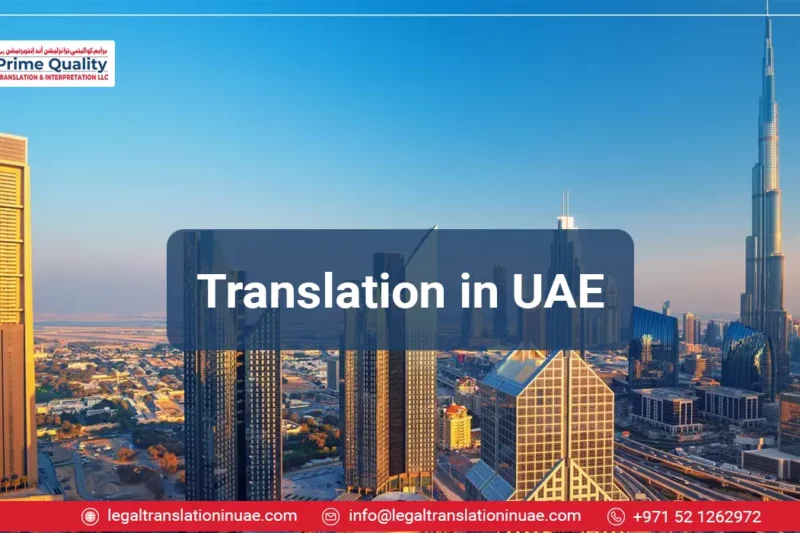
Do you want to conduct business in this energetic city? In this case, one thing is certain: communication is essential. With people from more than 200 different countries living in Dubai, Prime Quality Translation has established itself as a vital organization for bridging linguistic and cultural divides.
In this blog post, we'll examine how translation services in Dubai enhance communication and foster connectivity in this thriving global hub for trade, tourism, and innovation. Let's get started and explore the potential of translation in Dubai!
What Does Mean by Translation in Dubai?
The practice of translating spoken or written information from one language to another is commonly referred to as "translation" in Dubai. Due to the varied population and companies in Dubai, it's vital since it facilitates efficient communication by bridging language boundaries.
Translation in Dubai is highly sought after for several reasons, such as:
- Business
- Legal
- Tourism
- Communication
To promote understanding and communication between people who speak various languages, these services include translating websites, legal contracts, marketing materials, and more from one language to another.
To enable successful communication in this global center and assist in bridging language barriers, Prime Quality offers the best translation services in Dubai.
The Importance of Translation Services in the Multilingual Community of Dubai
One of Dubai's biggest assets is its multinational and diversified community. However, it also poses a special difficulty in terms of efficient communication. Given that the city is home to more than 200 different ethnicities, linguistic limitations may be a major challenge.
Translation services are essential for removing language barriers and promoting successful communication between speakers of various languages and cultures. These services facilitate connections, collaboration, and prosperity among enterprises, visitors, and locals in this global metropolis by offering precise and culturally appropriate translations.
Navigating Business Communications with Translation in Dubai
Effective communication is essential while conducting business in Dubai. The society's diversity and multiculturalism might make linguistic hurdles problematic. That’s where translation in Dubai comes in. By bridging linguistic and cultural gaps, these services guarantee clear and accurate corporate communication.
Translation in Dubai is the key to navigating the intricate business communications landscape in this global metropolis, whether you need to translate essential papers, connect with clients, or negotiate contracts.
Challenges of Language Diversity
Language diversity presents challenges such as:
- Limited Access to Education
- Inequality
- Loss Of Endangered Languages
- Standardization
- Power Imbalances
- Translation Challenges
- Identity Issues
- Communication Barriers
- Economic Disparities
- Cultural Erosion
To overcome these obstacles and guarantee effective communication between people and organizations with disparate language origins, translation services in Dubai are essential. These services, which range from precise document translation to conversation facilitation, are necessary for building understanding and overcoming gaps in Dubai's multilingual community.
Industries Benefiting from Translation
Translation services are crucial in various industries, facilitating global communication and market expansion.
1. E-Commerce
Translating product descriptions, user reviews, and customer support into multiple languages helps e-commerce businesses reach a global audience.
2. Travel and Tourism
Translation enables travel agencies, hotels, and airlines to cater to international tourists and offer information in their native languages.
3. Healthcare
Accurate translation of medical records, prescriptions, and patient information is essential for providing healthcare services to non-native speakers.
4. Legal
Legal documents, contracts, and court proceedings often require translation for international cases and clients.
5. Finance and Banking
Multilingual translation is essential for global financial institutions, facilitating transactions, agreements, and regulation compliance.
Boosting Business with Translation Services
The use of translation services might facilitate corporate growth in Dubai. Translation in Dubai may be pivotal in broadening your scope and fostering relationships with a varied clientele. Whether translating websites, product descriptions, or marketing materials, using Prime Quality translation services guarantees accurate and culturally appropriate communication.
You may successfully convey your message and build trust with your target audience by overcoming linguistic obstacles. Invest in translation services to ensure that language barriers don't impede your company's growth and success in this global center of opportunity.
Economic Impact of Translation
The economic impact of translation in Dubai cannot be overstated. As a global hub for trade and commerce, effective communication is crucial for businesses to thrive. Translation services are vital in bridging the language gap and enabling businesses to connect with international clients and partners.
By breaking down language barriers, translation services open doors to new markets, attract foreign investments, and contribute to the growth of Dubai's economy. The impact is not just limited to businesses but also extends to the tourism industry, where accurate translations allow visitors to explore and experience the rich culture of Dubai. Translation is an essential tool for economic success in this diverse and multicultural city.
The Role of Translation in Strengthening Dubai's Global Relations
Global ties are strengthened in Dubai through translation, facilitating unity and various relationships. It makes communication easier for people, companies, and organizations, encouraging cooperation, commerce, and development. Translation in Dubai serves as a link between individuals. It promotes the communication of ideas, which eventually advances the development and international prominence of the city.
Role of Prime Quality Translators
The foundation of Dubai's legal translation services is provided by Prime Quality translators. Our professionals smoothly communicate ideas, overcoming cultural differences and modifying information to facilitate understanding. We provide context and emotion in addition to literal translation to foster connections between locals, visitors, and companies in this multicultural metropolis.
Tips for Choosing a Translation Service Provider
Selecting the appropriate translation service provider is crucial to guaranteeing trustworthy and precise translations.
To assist you in choosing wisely, consider the following advice:
- Consider their proficiency in the particular sectors and languages you need. Seek out translators with experience in your sector and native speaking abilities.
- Assess their qualifications and quality assurance procedures. This guarantees that the translations will adhere to strict guidelines. To locate a service that meets your timeframe and budget, remember to ask about turnaround times and pricing.
- Examine reviews and get references to learn about their track record and level of client satisfaction.
Your best option for translation in Dubai is Prime Quality. We guarantee accuracy and cultural sensitivity since our native speakers have extensive industrial experience. We place a high value on quality and provide prompt service and affordable prices. We have an excellent reputation, so you can trust us for perfect translation.
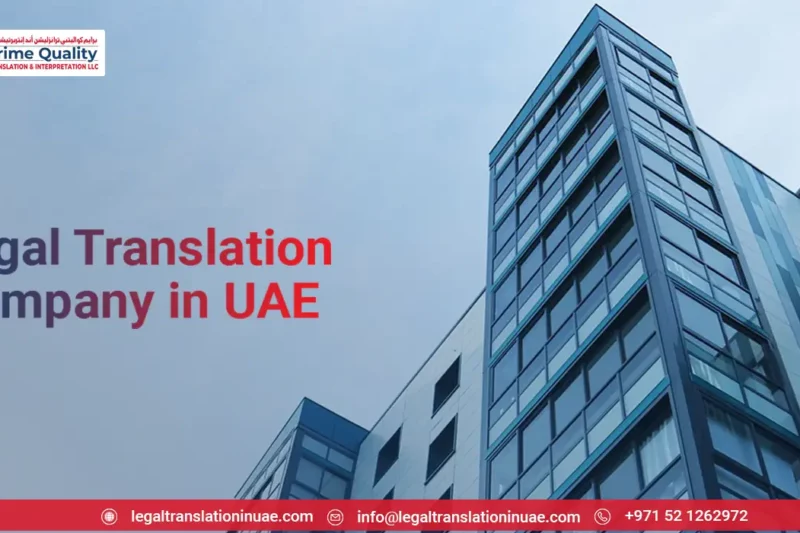
Welcome to Prime Quality Translation, the leading legal translation company in Dubai. If you need high-quality, accurate translations for your legal documents, look no further. Our team of expert translators is dedicated to providing top-notch language services to meet all your needs. From contracts and agreements to court documents and patent applications, we offer a one-stop solution for all translation needs.
Let us take the burden of language barriers off your shoulders and help you achieve success in the global market. Learn more about what we have to offer and how we can assist you.
Understanding the Importance of Legal Translation Services
Legal translation services ensure clear communication and understanding in the legal field. Accurate translations of legal documents are essential for various reasons, such as avoiding misunderstandings, complying with international laws and regulations, and protecting the rights and interests of all parties involved. Translation errors can have detrimental effects, such as:
- Legal Disputes
- Financial Loss
- Damaged Reputations
By utilizing professional valid translation services, you can ensure that your legal documents are accurately translated, eliminating any room for error or misinterpretation. Consider the importance of legal and accurate translation services in today's globalized world.
What to Look for in a Legal Translation Company in Dubai
When choosing a translation company, it's important to consider several factors.
- First, ensure that the company specializes in legal and accurate translation services to guarantee accuracy and expertise.
- Look for a company with a strong reputation and positive customer reviews, as this reflects their reliability and professionalism.
- Consider their confidentiality practices and how they handle sensitive legal documents.
- Finally, inquire about their quality assurance process to ensure the translations are accurate and error-free.
Benefits of Using a Professional Legal Translation Service in the UAE
There are several advantages to using a professional translation service, including:
- You can guarantee exact and correct translations, removing any possibility of mistakes or misunderstandings.
- Depending on their skilled group of translators knowledgeable with legal jargon and language, you may save time and effort.
- You can rest easy knowing that your legal papers will be handled with the highest discretion and professionalism if you choose a respectable company like Prime Quality.
- Using a professional translation service may improve legal industry communication and comprehension significantly.
Why Choose a One-Stop Company for All Your Legal Translations Needs?
There are several benefits to selecting a one-stop company for all of your translation requirements.
- It lowers expenses, improves efficiency, and simplifies the procedure.
- A trustworthy translation agency guarantees consistency in terminology and style, reducing mistakes.
- These companies also use qualified, experienced translators who are skilled in handling a variety of papers and have a strong command of legal terminology.
- This method maintains the greatest levels of accuracy and secrecy while also saving time.
- A one-stop company provides quality and convenience for all your legitimate translation needs, whether you're a corporate, personal, or legal firm. This increases the effectiveness of cross-cultural communication.
Choose Prime Quality, a reputable legal translation company in Dubai, for all your legal and professional translation needs. We provide a one-stop solution, translating all of your legal documents—from contracts to court cases—accurately and consistently. You can rely on us for excellence and client happiness.
Types of Legal Documents Requiring Translation
There are many different types of legal papers, and each one can need translation services. Contracts are among the typical legal documents that frequently require translation including:
- Arrangements
- Court Rulings
- Attorney Power of Attorney Records
- Applications for Patents
- Immigration Certificates
Translation services may also be required for legitimate papers about employment, real estate, intellectual property, and mergers and acquisitions. Selecting a legal translation company in Dubai that can handle the particular kinds of documents you need to be translated properly and quickly is crucial, regardless of whether you are a law firm, a global organization, or an individual handling legal problems.
Unique Qualities of Our Legal Translation Services
Our company, Prime Quality Translation, is distinguished by its distinct attributes and methodology. We guarantee accurate and dependable translations for all of your legal papers thanks to our staff of highly qualified translators who specialize in legal language and terminology.
We prioritize accuracy and efficiency in all our translations, demonstrating our dedication to quality and client pleasure. You can rely on us to handle your papers professionally and privately. Select us because of our proficiency, dependability, and commitment to fulfilling your language requirements.
How Our Process for Legal Translation Operates
Our legal and accurate translation procedure is intended to guarantee precision, effectiveness, and privacy. Our highly qualified translators will thoroughly check and analyze your legal papers after you submit them. The most competent translator for the particular language pair and legal subject area is then assigned by us. Our translators carefully consider legal terminology and language as they apply their experience to translate your papers appropriately.
To guarantee correctness, the translation undergoes a stringent quality assurance procedure when it is finished. Ultimately, we provide the translated papers on schedule. You can rely on Prime Quality to offer a seamless and trustworthy translation service.
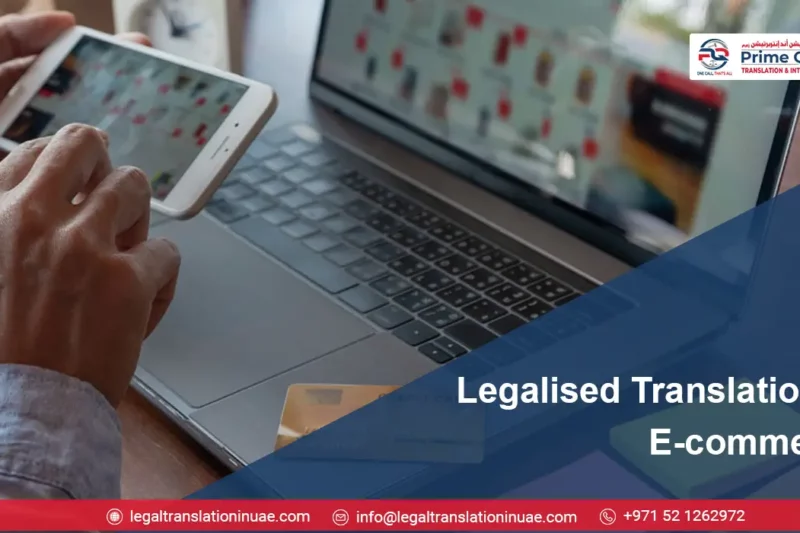
Are you prepared to advance the growth of your e-commerce business? With the growing trend of globalization, companies must expand their markets beyond borders. However, language barriers can often hinder this growth. That's where Prime Quality Translation comes in.
Prime Quality legalised translation allows businesses to easily and accurately translate their content into different languages, making us accessible to a wider audience. In this blog post, we'll explore the benefits of legalised and accurate translation in e-commerce and how we can help you tap into new markets and increase your revenue.
Understanding the Role of Legalised Translation in E-Commerce
Legalised translation is essential to the growth of international e-commerce. It guarantees that the material you publish online is appropriately translated and sensitive to cultural differences, facilitating efficient connections with clients worldwide.
Legalised translation may help you communicate with a larger audience and overcome language obstacles, which can expand your market reach and boost your sales abroad.
Exploring the Advantages of Localizing Online Retailing Across Borders
Localizing your content is essential for growing your online retail business internationally. Prime Quality legal translation services may help you translate your online retailing activities so clients from other nations can more easily comprehend and relate to your brand.
Language obstacles are eliminated by localization, which also enables a culturally sensitive approach and increases the likelihood that your intended audience will understand your message. Your foreign sales can soar when you use Prime Quality and enjoy the advantages of expanded consumer interaction and market reach.
The Importance of Accurate and Certified Translation
For these reasons, accurate and certified translation is essential in e-commerce.
- It guarantees that your target audience receives your message clearly and concisely, preventing misconceptions or confusion.
- It builds rapport with your clients by demonstrating appreciation for their language and culture.
- It assists you in adhering to national and international legal criteria, guaranteeing that your company runs within the bounds of the law.
- You can safely extend your business across borders by giving accurate and certified translation top priority since you will effectively contact your foreign clients.
Overcoming Cultural Barriers to International E-Commerce Success
Cultural differences can sometimes hamper the success of your worldwide e-commerce expansion. You may, however, get around these obstacles and establish a connection with clients from various cultural backgrounds by using legal translation, often known as Prime Quality.
We guarantee that the translation of your web material is precise and sensitive to cultural differences, facilitating efficient communication and a more profound comprehension of your intended audience. Accepting legalised translation can help you get beyond cultural obstacles, gain the confidence of clients abroad, and eventually succeed in international e-commerce.
Challenges of Legalised Translation in E-Commerce
While legalized translation offers significant benefits to e-commerce, there are challenges to overcome:
1. Cost
Professional translation services can be costly, particularly when multiple languages are involved. But typically, the long-term advantages surpass the initial outlay.
2. Maintaining Consistency
Ensuring consistent translation across all e-commerce materials can be challenging. Using translation management tools and working with experienced translators is key to maintaining quality.
3. Legal Complexities
Understanding the legal requirements in various countries can be intricate. Businesses may need legal counsel or experts in international law to ensure compliance.
4. Evolving Content
E-commerce content is dynamic and ever-changing. Keeping translations updated and in sync with the original content requires ongoing effort.
Implementing Legalised Translation for Expanding Your Market
Putting into practice competent and legally sound translation is a critical first step in growing your business globally. We may efficiently translate your web material and establish connections with clients from several nations by implementing legal translation into your e-commerce strategy.
We provide a culturally aware strategy that connects with your target audience and removes linguistic hurdles. You can confidently reach a wider audience, seize new chances, and increase your sales abroad using Prime Quality. Profit from the expansion that might occur when you include legalised or certified translation into your online store.
Legalised Translation: The Solution
Legalised translation refers to translating and certifying documents to ensure their authenticity and legal validity. In e-commerce, legalized translation solves critical documents such as terms and conditions, privacy policies, contracts, and product descriptions to reach a wider audience and ensure compliance with local regulations.
Here's why legalized translation is becoming increasingly essential in e-commerce:
1. Expanded Market Reach
By translating essential e-commerce content into multiple languages, businesses can effectively reach customers in different regions. This boosts their market reach and allows them to tap into new and potentially lucrative markets.
2. Improved Customer Trust
Customers are more likely to trust and engage with a website that speaks their language. Offering content in the customer's native language makes them feel valued and respected, thus fostering trust and loyalty.
3. Legal Compliance
Different countries have distinct legal requirements for e-commerce. Legalized translation ensures that businesses comply with local laws and regulations, protecting them from potential legal issues.
4. Enhanced User Experience
Providing content in a customer's native language enhances their shopping experience. Customers can easily understand product information, shipping terms, and return policies, leading to better understanding and returns.
5. Competitive Advantage
Businesses that invest in legalized translation gain a competitive advantage in the global e-commerce landscape. They stand out as reliable and customer-centric, which can translate into higher sales and customer retention.
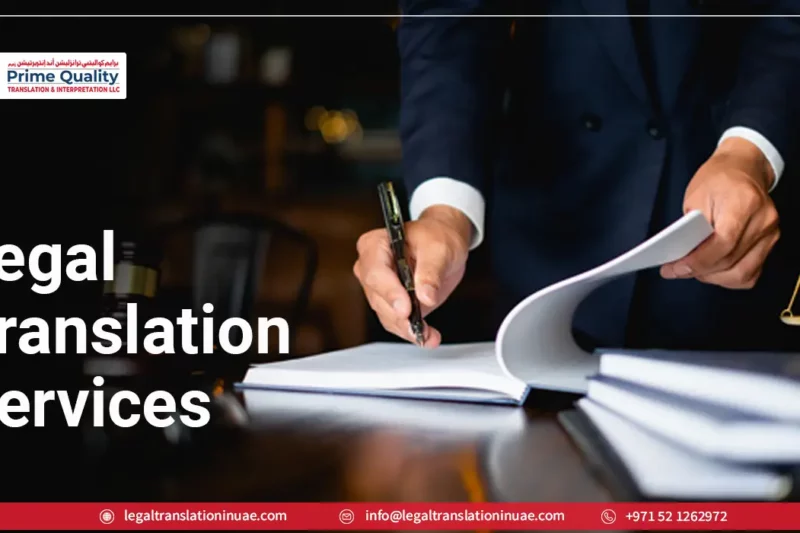
In Dubai, do you require legal translation services? You only need to look at Prime Quality Translation! For our clients, we streamline the process and eliminate any hassles with our precise and accurate translation services. We know that navigating the legal system may be intimidating, particularly when there are linguistic difficulties.
For this reason, we provide accurate and proficient translation services to enable you to interact with Dubai's legal authorities clearly and quickly. Our skilled translators guarantee accuracy and confidentiality in all your translations and are well-versed in legal jargon. Allow us to ease your worry and handle your precise and valid translation needs.
Understanding the Need for Legal Translation Services in Dubai
Today's globalized world has made the United Arab Emirates (UAE) a major center for foreign companies and expats. Translation services are therefore more necessary than ever. To guarantee appropriate communication between parties, several legal documents, including contracts, agreements, and court decisions, must be translated appropriately.
Language hurdles may also make legal problems more complicated, which is why it's critical to have a competent translation service that is knowledgeable about legal terms and the legal system. Our staff at Prime Quality Translation is here to make the process easier for you since we understand how important precise and clear translations are.
Types of Legal Documents Requiring Translation
It is essential to ensure accuracy and clarity in legal papers. A broad range of documents are covered by legal and accurate translation services, including but not limited to:
1. Agreements and Contracts
To ensure that everyone concerned understands their rights and duties similarly, contract translation is essential.
2. Court Records and Materials for Litigation
For judicial processes and conflicts involving parties from diverse language origins, accurate translation of court papers is crucial.
3. Documentation of Intellectual Property
Protecting intellectual property in a worldwide marketplace requires translating papers about intellectual property, such as patents and trademarks.
4. Visa and Immigration Documents
When interacting with Dubai's immigration officials, individuals and companies must have their immigration and visa-related documentation translated.
We know that translation services are necessary for these kinds of legal papers. We ensure every document is translated correctly, accounting for Dubai-specific legal jargon and subtleties. Let Prime Quality handle your legal document translation requirements so you can go past linguistic boundaries.
Challenges in Legal Translation
There can be several difficulties with legal and accurate translation, particularly with clarity and accuracy.
1. Terminology and Legalese
Legal papers can contain technical language and jargon that need a thorough comprehension of the relevant legal systems.
2. Culture Sensitivity
To guarantee that translations honor the cultural quirks and background of the intended audience, translators need to possess cultural sensitivity.
3. Precision and Propriety
Legal materials sometimes include sensitive information. Thus, translations must be done as accurately as possible while maintaining secrecy.
Prime Quality is aware of these difficulties with translation and the value of accurate translations. We carefully go through intricate legal papers, ensuring every word is translated correctly. Our skilled staff is prepared to tackle any difficulties that may come up throughout the translation process.
Legal Translation Process
There are many steps involved in a dependable, transparent, and lawful translation process:
1. Analysis of Documents
To comprehend the background and the relevant legal systems, the procedure starts with carefully examining the legal papers.
2. Interpretation by Skilled Experts
The translation is completed by qualified translators with experience in law, guaranteeing that the content is faithfully translated into the target language.
3. Quality Control and Editing
Proofreading is one of the quality control procedures used to ensure the maximum degree of correctness and eliminate mistakes.
4. Notarization and Certification
The translated papers may need notarized or certified to verify their accuracy and dependability.
Choosing Prime Quality Legal Translation Services in Dubai will simplify the process for you from beginning to end. Please give us the papers that need to be translated, and our staff of qualified translators with expertise will take care of the rest.
We make sure that every word is translated precisely, taking into account Dubai's unique legal jargon and subtleties. You can rely on us for accurate translations that satisfy your legal requirements thanks to our effective procedure.
Importance of Our Accurate Legal Translations
Getting accurate translations is crucial while navigating Dubai's judicial system. Misunderstandings, arguments, and even legal issues can result from incorrect interpretation or translation of legal documents.
You can count on our group of qualified translators to provide accurate and trustworthy translations when you use our legal translation services in Dubai. We aim to deliver you translations that preserve the integrity of your legal papers, and we are aware of the complexities involved in legal language and the importance of accuracy.
Tips for Effective Legal Translation
For a smooth translation process and optimal results, consider the following tips:
1. Communication with Translators
Open and clear communication with the translators helps them understand the context and requirements of the translation.
2. Providing Context
Providing additional context and reference materials can improve the quality and accuracy of the translation.
3. Review and Feedback
Encouraging clients to review the translated documents and provide feedback ensures that concerns or questions are addressed promptly.
These tips foster collaboration between clients and translation professionals, resulting in a more effective translation process.
Legal Translation Costs in Dubai
The following variables might affect the cost of translation in Dubai:
1. Complexity of Documents
More complicated legal documents might cost more since they need more work and knowledge.
2. Pairs of Languages
The cost of the translation may also vary depending on the languages used.
3. Serenity
Quick turnaround times might cost more.
Prime Quality charges fairly and openly for the services provided. The cost of legal and accurate translation services in Dubai may differ based on the following:
- The document's intricacy
- The quantity of text
- The necessary turnaround time
However, we work hard to deliver accurate translations at a reasonable cost without sacrificing quality. In close collaboration with you, our staff will ascertain your precise requirements and present you with a price within your means. For a free consultation and additional information about our legal and certified translation costs in Dubai, contact us right now.
Why Choose Prime Quality Legal Translation Services
For all of your legal and accurate translation requirements in Dubai, Prime Quality is the company to call. Our staff of proficient translators have extensive knowledge of legal jargon and deliver dependable and precise translations.
You may feel secure knowing that your legal documents are in good hands when you use our services. Don't risk your translations; trust our expertise and knowledge.
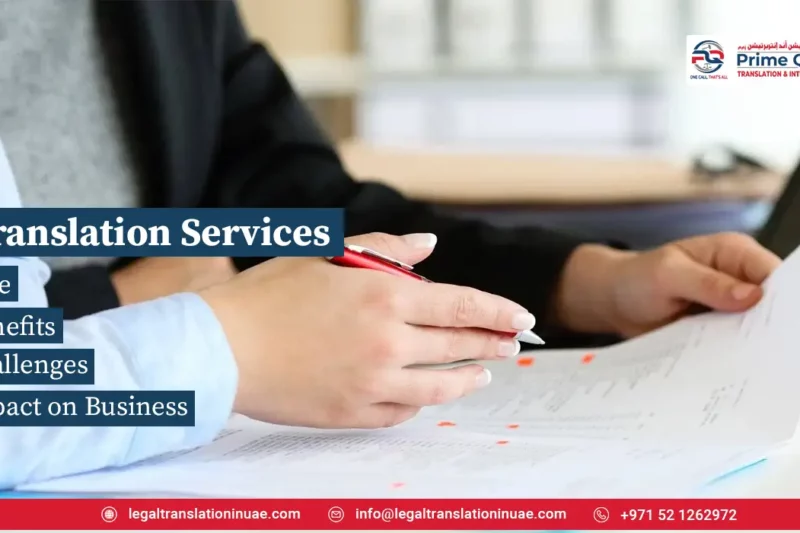
Welcome to our blog post! As, a city known for its diverse population and flourishing business landscape, Dubai has become a hub for international trade and commerce. With the increasing need for global communication, translation is crucial in bridging language barriers and facilitating smooth business operations.
In this post, we will explore the role of translation, the challenges translators face, the benefits of accurate translations, and the impact it has on businesses. So, let's dive in and discover the fascinating world of translation in Dubai!
The Crucial Role of Translation in Dubai's Multicultural Business Environment
Translation plays a crucial role in the city's multicultural business environment. With a diverse population and a thriving business landscape, effective translation enables smooth communication between people from different language backgrounds. It helps businesses overcome language barriers, build trust, and foster strong relationships with international clients and partners.
Translation in Dubai ensures that information, contracts, and agreements are accurately understood and implemented, facilitating successful business operations. In a city known for its global connectivity, translation is the key to bridging the gap between cultures and ensuring a thriving and inclusive business environment.
The Unique Challenges Faced by Translators in Dubai
Translation presents unique challenges for translators due to the city's multicultural and diverse business environment.
- The first challenge is simultaneous translation, especially in conferences, business meetings, and events. Translators must possess excellent linguistic skills and the ability to process information and convey it accurately in real-time quickly.
- Another challenge translators face in Dubai is the diverse range of languages spoken in the city. Dubai attracts professionals from all over the world, resulting in a melting pot of languages. Translators must be well-versed in multiple languages to meet the demands of various clients and industries.
- Moreover, cultural sensitivity is crucial for translators in Dubai. Understanding cultural nuances and context is essential for accurate and culturally appropriate translations. Translators must adapt their translations to suit the target audience while ensuring that the original meaning and intention are preserved.
- Lastly, the fast-paced nature of business in Dubai poses a challenge for translators. The city's thriving business landscape demands quick turnarounds and timely translations. Translators must work efficiently without compromising the quality of their translations.
Despite these challenges, hiring Prime Quality translators in Dubai plays a vital role in facilitating effective communication and ensuring successful business operations in a multicultural environment. Our expertise and dedication enable businesses to overcome language barriers and thrive in a global marketplace.
Benefits of Translation in Dubai
Translation in Dubai is pivotal for the global environment, offering seamless communication and enhanced operations. Here are some benefits.
1) Cultural Integration
It aids in the integration of various cultures, making it easier for residents to adapt to the new environment.
2) Business Expansion
For businesses, translation opens up markets by making products and services accessible to non-English-speaking communities, both locally and internationally.
3) Legal Compliance
In legal matters, precise translation is crucial for understanding contracts, agreements, and regulations.
4) Tourism
Tourists feel more comfortable when they can access information, signage, and services in their native language.
5) Education
Translation helps non-native speakers access education materials and educational services, contributing to a well-educated and skilled workforce.
In Dubai, professional translation services, like Prime Quality Translation, are essential for global businesses, helping them overcome language barriers and build strong relationships to thrive in the global marketplace.
The Transformative Impact of Translation on Dubai's Business Landscape
Translation in Dubai is a game-changer for businesses. It helps them talk to people who speak different languages, making it easier to build trust and partnerships. When you remove language hurdles, you can explore new markets and grow globally.
Plus, it keeps things professional, follows the law, and boosts a company's image. In Dubai's diverse setting, translation is the secret to a successful and welcoming business scene.
The Future of Translation in Dubai - Opportunities and Predictions
As Dubai continues to flourish as a global business hub, the future of translation in the city holds exciting opportunities and predictions. With advancements in technology, we expect to see innovative translation tools and software that will enhance the efficiency and accuracy of translations. Machine translation and artificial intelligence will play a more significant role, providing quick and automated translations.
However, human translators will still be crucial in maintaining cultural sensitivity and adapting translations to suit the target audience. As Dubai attracts more international businesses, the demand for professional translation services will continue to grow, offering promising career opportunities for translators in the city. Overall, the future of translation in the UAE is bright, with endless possibilities for growth and advancement.

